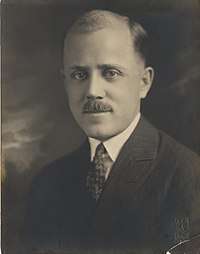Eskimo Pie
 1943-1954 Eskimo Pie design for cardboard, ice cream box | |
| Product type | Ice cream bar |
|---|---|
| Owner | Chipwich, Dreyer's division of Nestlé |
| Country | U.S. |
| Introduced | 1921 |
| Markets | United States, International |
| Previous owners | Russell Stover and Christian Kent Nelson (founders) |

Eskimo Pie is a brand name for a chocolate-covered vanilla ice cream bar wrapped in foil, the first such dessert sold in the United States. It is now marketed by Nestlé, owners of Dreyer's of the Western United States, and Edy's of the Eastern United States. The product was introduced to New Zealand in the 1940s,[1] and is produced by Tip Top who are now a subsidiary of Fonterra, the country's largest multinational company.[2]
History
Danish immigrant Christian Kent Nelson (1893-1992),[3] a schoolteacher and candy store owner, claimed to have received the inspiration for the Eskimo Pie in 1920 in Onawa, Iowa, when a boy in his store was unable to decide whether to spend his money on ice cream or a chocolate bar.[4] After experimenting with different ways to adhere melted chocolate to bricks of ice cream, Nelson began selling his invention, under the name "I-Scream Bars". In 1921, he filed for a patent, and secured an agreement with local chocolate producer Russell C. Stover to mass-produce them under the new trademarked name "Eskimo Pie" (a name suggested by Mrs. Stover), and to create the Eskimo Pie Corporation. After patent 1,404,539 was issued on January 24, 1922, Nelson franchised the product, allowing ice cream manufacturers to produce them under that name. The patent, which applied to any type of frozen confection encased in candy, was invalidated in 1928.[5]
One of the earliest advertisements for Eskimo Pies appeared in the November 3, 1921 issue of the Iowa City Press-Citizen.[6]


Stover sold his share of the business. He then formed the well-known chocolate manufacturer Russell Stover Candies.[7] Nelson became independently wealthy off the royalties from the sale of Eskimo Pies. In 1922 he was selling one million pies a day.[8]
Nelson then sold his share of the business to the United States Foil Company, which made the Eskimo Pie wrappers. He retired at a young age, but reportedly out of boredom rejoined what was then called Reynolds Metals Company (now part of Alcoa) in 1935, inventing new methods of manufacturing and shipping Eskimo Pies and serving as an executive until his ultimate retirement in 1961.
In 1992, Nelson died at the age of 99. In that same year, Eskimo Pie Corporation was spun off from Reynolds in an initial public offering, as an alternative to an acquisition that Nestlé had proposed in 1991.
The original round-faced child icon for the brand was created by the illustrator Gyo Fujikawa.
CoolBrands and Nestlé
CoolBrands International, a Markham, Ontario-based company, acquired Eskimo Pie Corporation in 2000.
Originally a yogurt maker, CoolBrands at one point owned or held exclusive long-term licenses for brands including Eskimo Pie, Chipwich, Weight Watchers, Godiva, Tropicana, Betty Crocker, Trix, Yoo hoo and Welch's. The company encountered financial difficulties after losing the Weight Watchers/Smart Ones licence in 2004[9] and sold its restaurant franchise division at the end of 2005.
By 2007, CoolBrands was selling off core assets. In February 2007, CoolBrands sold Eskimo Pie and Chipwich to the Dreyer's division of Nestlé.[10][11] Its DSD (Direct Store Delivery) operation, a Whole Fruit business and the Breyers yogurt brand were sold to other companies,[12] leaving little more than a publicly listed shell which was merged with Swisher Hygiene Inc. in a 2010 reverse takeover.
Licensed companies
Companies around the world which licensed the "Eskimo Pie" name and manufacturing process include:
- Alaska Ice Cream of South Australia in 1923.[13]
Racial controversy
Use of the term "eskimo" may be considered to be offensive in some parts of the world, particularly in Canada and Greenland. In New Zealand, an Inuk tourist from Canada complained in 2009 that the use of Eskimo was racially insulting.[14] The manufacturer and Cadbury Pascall, which produces the similarly named Eskimo marshmallow sweets, both said there were no plans to rename the products or to cease production.[1][15]
In other countries
.jpg)
In the countries of the former Soviet Union as well as in France the word "Eskimo" is used as a generic name, not a trademark, for chocolate-covered ice-cream with a wooden stick to handle it.
See also
Notes
- 1 2 "Eskimo stays despite frosty reception". The New Zealand Herald. NZPA. April 22, 2009. Retrieved September 29, 2011.
- ↑ "Tip Top Eskimo Pie – Fonterra Food Services – Products". Fonterra Food Services. Retrieved 2013-07-20.
- ↑ www.findagrave.com
- ↑ James T. Ehler (1992-03-08). "Christian Kent Nelson: Who's Who in Food History". Foodreference.com. Retrieved 2013-07-20.
- ↑ Duan, Charles (20 October 2015). "Ice Cream Patent Headache". Slate. Retrieved 26 October 2017.
- ↑ "Eskimo Pies". Retrieved 2007-08-12.
- ↑ "History of Russell Stover Candies Inc. – FundingUniverse". Fundinguniverse.com. Retrieved 2013-07-20.
- ↑ Duan, Charles (20 October 2015). "Ice Cream Patent Headache". Slate. Retrieved 20 October 2015.
- ↑ "CoolBrands sells Eskimo Pie, Chipwich brands to Dreyer's". CBC News. 2007-01-24. Retrieved 2014-07-28.
- ↑ CoolBrands press release announcing sale of Eskimo Pie and Chipwich
- ↑ "History of Eskimo Pie Corporation – FundingUniverse". Fundinguniverse.com. Retrieved 2013-07-20.
- ↑ "Healthy Food Holdings to Acquire Breyers(R) Yogurt Business – re> BOULDER, Colo., Jan. 2". Prnewswire.com. Retrieved 2013-07-20.
- ↑ "Alaska Ice Cream Company". The Register. Adelaide: National Library of Australia. 29 August 1923. p. 7. Retrieved 12 May 2015.
- ↑ "It's the great Eskimo debate". Waikato Times. April 23, 2009. Retrieved September 29, 2011.
- ↑ "Eskimo lolly will have no name change". Television New Zealand. April 22, 2009. Retrieved September 29, 2011.
External links
| Wikimedia Commons has media related to Eskimo Pie. |
- History of the Eskimo Pie, from the Smithsonian Institution
- Neilson Dairy history
- U.S. Patent 1,404,539
- CoolBrands press release announcing sale of Eskimo Pie to Dreyer's
- Revello Bars, a similar bar from Popsicle.